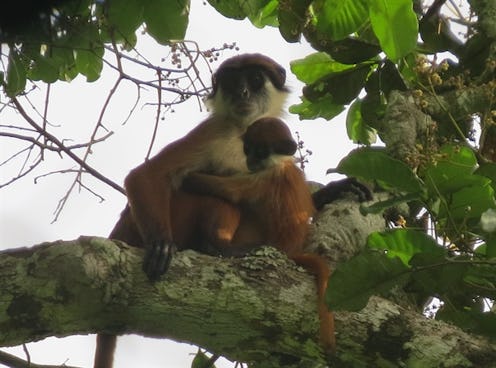News
Rare Monkey Spotted After 50-Year Disappearance

The Bouvier's red colobus monkey is apparently one of the most camera-shy monkeys in the Republic of Congo. They're so camera shy that they allegedly haven't been spotted in forests for more than half a century, according to a press release from the Wildlife Conservation Society (WCS). The Bouvier's red colobus monkey hadn't been seen in so long that some people believed it was extinct, until independent researchers Lieven Devreese and Gaël Elie Gnondo Gobolo set off in Ntokou-Pikounda National Park in February, hoping to find and photograph one.
With the help of local people familiar with red colobus vocalizations and behavior, the team found a group of red colobus in the swamp forests along the Bokiba River in the national park. Their expedition was supported by donations collected through the crowdfunding website Indiegogo, and funding from the WCS, according to Live Science. They have since returned with the first-ever snapshot of a mother and infant. According to Live Science, the researchers posted a statement on their Indiegogo in March:
After searching the swamps on the left bank of the Bokiba River for four days, changing camp twice — and just before running out of food, battery and courage — we finally found a group of Bouvier's red colobus monkeys on Monday. What a beautiful monkey!
There are several species of red colobus monkey, but scientists only knew about the Bouvier's red species from a few museum specimens that were more than 100 years old, according to Live Science.
"Our photos are the world's first and confirm that the species is not extinct," said Devreese, one of the field researchers, according to the WCS press release.
Red colobus monkeys usually don't flee from humans, but will instead peer down at them curiously from trees. WCS said this is one of the unfortunate behavioral characteristics that led to them being targeted and killed by hunters. They are some of the many species threatened by the growing demand for bushmeat in the region and industrialization that leads their hunting, such as the expansion of logging, agriculture, or roads, Fiona Maisels of WCS said in the press release.
According to NPR, the society collected audio recordings in Ntokou-Pikounda National Park of calls thought to match the red colobus monkey in 2007 and 2014, but they were rarely encountered and no one had ever photographed them. James Deutsch, vice president for conservation strategy at WCS, said in the release:
Confirmation that Bouvier’s red colobus still thrives in the this area reminds us that there remain substantially intact wild places on Earth, and should re-energize all of us to save them before it is too late.
Image: Wildlife Conservation Society/Lieven Devreese